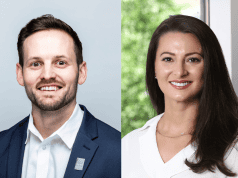As our nation and Emory University celebrate Veterans Day on November 11, this month is a time to remember the military personnel—active duty and veterans—who have stepped forward to serve. We talked to one of those service members, a Goizueta alumni, to have them share insights and how their Goizueta experience and military journey still impacts life and work today.

Jesse Sladek 19EMBA
Senior Lead Value Engineer
TIBCO Software
Originally from Olympia, Washington, Jesse Sladek 19EMBA joined the Army after 9/11. He currently works as a value (sales) engineer for TIBCO, an enterprise software company that helps businesses solve data and digital transformation problems. He loves the cutting-edge, competitive, fast-paced nature of the work that he likes to call “white collar sports” and has been surprised to find that many of the skills and instincts developed as a combat leader are valuable in the technology sales arena.
What was your rank in the military? What element of the military journey do you still use today in life or work?
I left active duty as a major after about 11 years, including three tours as a ranger in Iraq and Afghanistan during the peak of combat operations. Military operations/business/life are team sports—what Harry Truman said decades ago comes to mind: “It is amazing what you can accomplish if you do not care who gets the credit.”
Who inspires you and why?
Those who defend the weak, provide hope for the hopeless, and see the world first and foremost through a lens of love for their fellow travelers.
How did Goizueta prepare you for the field you are in today?
I entered the civilian workforce with extensive training in leadership and operations but with nascent business knowledge. The Goizueta EMBA taught me how to speak the language of business and provided me with a number of mental models to apply to the particular business problem I’m trying to solve, making my prior experiences much more relevant and valuable in the corporate context.
What was your favorite course at Goizueta?
Every course provided me greater insight and a doctrinal framework for how business gets done. However, in my opinion, our cohort benefitted greatly from the bonding that came from the shared experience of a miserably wet and cold Leader’s Reaction Course, guided by retired Lt. Gen. Ken Keen, associate dean for leadership, a fellow ranger who continues to serve this country.
What is the best advice you’ve ever received, in business or life?
Two things:
- Figure out what the next right thing is, and then do it.
- Speed and surprise overcome a variety of operational shortcomings.
Is there a lasting lesson, memory or skill gained from business school that you particularly remember or credit your success to?
My cohort was amazing—and it was a very mutually beneficial relationship—these folks, executives and leaders in their industries, had what I wanted: extensive business experience. And in many cases, I had the opportunity to share my leadership philosophy and demonstrate how humility and creativity are competitive differentiators in a team environment. In this manner, we helped each other grow—and we remain in close contact.
What advice do you have for today’s business students?
Some of life’s greatest lessons come from the bitter ashes of failure. Per Henry Ford, “experience is the thing of supreme value.”
Please describe some professional and personal goals.
Although my service on the front lines of our nation’s foreign policy is over, I still care deeply about this country, and I want to leave it better and stronger for my children. I see digital transformation of the manufacturing sector and our military as critical areas of national security and areas where I am uniquely qualified to contribute to what has historically been a repository of strength. If America is to remain globally competitive and a wellspring of freedom, we have to figure out how to apply data-driven decision making, artificial intelligence, and modern operating models to manufacturing and defense. It is my goal to create a company that feeds my soul with service towards a cause greater than myself and fulfills a critical need.











